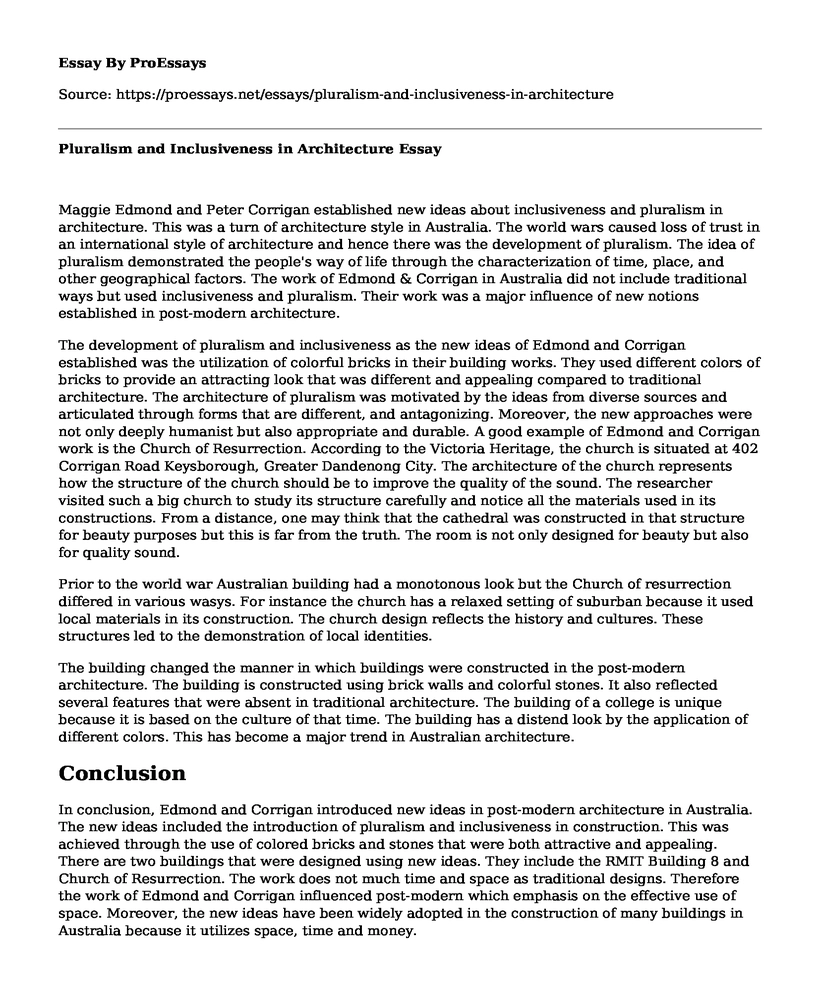Maggie Edmond and Peter Corrigan established new ideas about inclusiveness and pluralism in architecture. This was a turn of architecture style in Australia. The world wars caused loss of trust in an international style of architecture and hence there was the development of pluralism. The idea of pluralism demonstrated the people's way of life through the characterization of time, place, and other geographical factors. The work of Edmond & Corrigan in Australia did not include traditional ways but used inclusiveness and pluralism. Their work was a major influence of new notions established in post-modern architecture.
The development of pluralism and inclusiveness as the new ideas of Edmond and Corrigan established was the utilization of colorful bricks in their building works. They used different colors of bricks to provide an attracting look that was different and appealing compared to traditional architecture. The architecture of pluralism was motivated by the ideas from diverse sources and articulated through forms that are different, and antagonizing. Moreover, the new approaches were not only deeply humanist but also appropriate and durable. A good example of Edmond and Corrigan work is the Church of Resurrection. According to the Victoria Heritage, the church is situated at 402 Corrigan Road Keysborough, Greater Dandenong City. The architecture of the church represents how the structure of the church should be to improve the quality of the sound. The researcher visited such a big church to study its structure carefully and notice all the materials used in its constructions. From a distance, one may think that the cathedral was constructed in that structure for beauty purposes but this is far from the truth. The room is not only designed for beauty but also for quality sound.
Prior to the world war Australian building had a monotonous look but the Church of resurrection differed in various wasys. For instance the church has a relaxed setting of suburban because it used local materials in its construction. The church design reflects the history and cultures. These structures led to the demonstration of local identities.
The building changed the manner in which buildings were constructed in the post-modern architecture. The building is constructed using brick walls and colorful stones. It also reflected several features that were absent in traditional architecture. The building of a college is unique because it is based on the culture of that time. The building has a distend look by the application of different colors. This has become a major trend in Australian architecture.Conclusion
In conclusion, Edmond and Corrigan introduced new ideas in post-modern architecture in Australia. The new ideas included the introduction of pluralism and inclusiveness in construction. This was achieved through the use of colored bricks and stones that were both attractive and appealing. There are two buildings that were designed using new ideas. They include the RMIT Building 8 and Church of Resurrection. The work does not much time and space as traditional designs. Therefore the work of Edmond and Corrigan influenced post-modern which emphasis on the effective use of space. Moreover, the new ideas have been widely adopted in the construction of many buildings in Australia because it utilizes space, time and money.
References
Victoria Heritage. Victorian Heritage Database Report: Church of the Resurrection. 2018. Retrieved May 10, 2018, from http://vhd.heritagecouncil.vic.gov.au/places/162358/download-report
Smith, C. Ray. Supermannerism: new attitudes in post-modern architecture. Dutton, 1977.Doug Evans (ed., contrib.), Aardvark: the RMIT Guide to Contemporary Melbourne Architecture, RMIT, Melbourne, 1990, pp. 62-69; Aardvark II, RMIT, Melbourne, 1995, including Peter Brew's essay, 'Australians don't need piazzas, they should be at home watching TV', and 'Edmond and Corrigan', pp. 7-14 ff.
Leon van Schaik (ed., contrib.), with Winsome Callister and Nigel Bertram, and a series of others: Building 8: Edmond and Corrigan at RMIT, 3 vols., Transition Publishing, Melbourne, 1995
Rory Spence, 'Regional Identity', Melbourne: City of the Mind' and 'Controversial Corrigan', in The Architectural Review, whole issue on Australia, and Sydney/Melbourne, 178, No. 1066, December 1985, esp. pp. 62-66, 69-75
Norman Day, Modern Houses Melbourne, Brian Zouch, Melbourne, 1977
Mann, Dennis Alan. "Architecture, aesthetics, and pluralism: Theories of taste as a determinant of architectural standards." Studies in Art Education 20, no. 3 (1979): 15-29.
Hunn, Peter. Free symposium honours Peter Corrigan, Edmond and Corrigan. 2018. ArchitectureAu. Retrieved May 10, 2018, from https://architectureau.com/articles/free-symposium-honours-peter-corrigan-edmond-and-corrigan/Corrigan, P., And M. Edmond. "'Church-Of-The-Resurrection-Corrigan-Road, Keysborough, Victoria, Australia-1976-Edmond-And-Corrigan." A+ U-Architecture And Urbanism 127 (1981): 57-60.
van Schaik, Leon. "Differentiation in Vital Practice: An Analysis Using RMIT University of Technology and Design Interfaces With Architects." Architectural Design 83, no. 1 (2013): 106-113.
Cite this page
Pluralism and Inclusiveness in Architecture. (2022, Mar 09). Retrieved from https://proessays.net/essays/pluralism-and-inclusiveness-in-architecture
If you are the original author of this essay and no longer wish to have it published on the ProEssays website, please click below to request its removal:
- Cinematic Invisibility in the Film the "Brokeback Mountain" Essay
- Film Analysis Essay on Twelve Years a Slave (2013)
- Arts and Architecture: Analysis of Architectural Features Essay
- Essay Sample on Orchestra Concert by the MIT Symphony Orchestra
- Essay Example on Interpersonal Relationships in the Film Love Jones
- Paper Example on Lil Uzi Vert's Eternal Atake: A Milestone in Hip-Hop History
- Essay Sample on Drug Addiction: An Escalating Epidemic of Our Times







